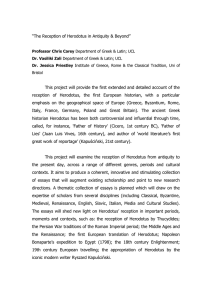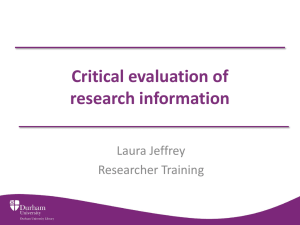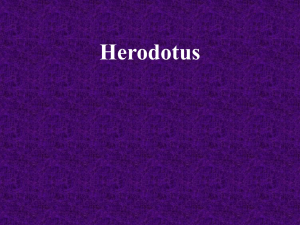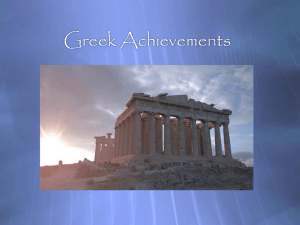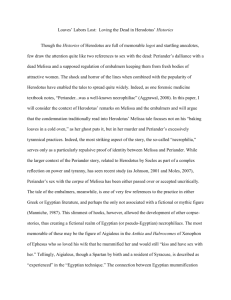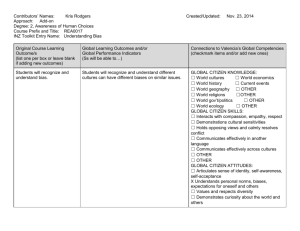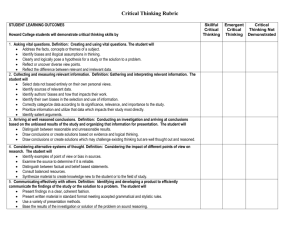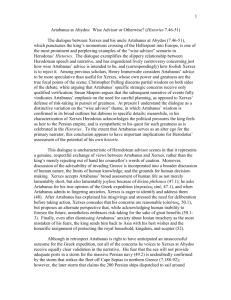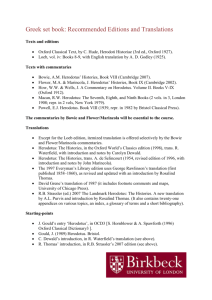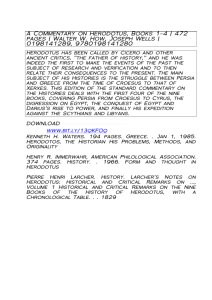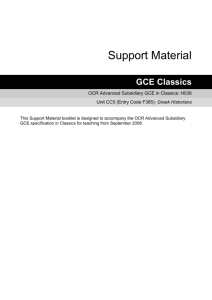beaupre
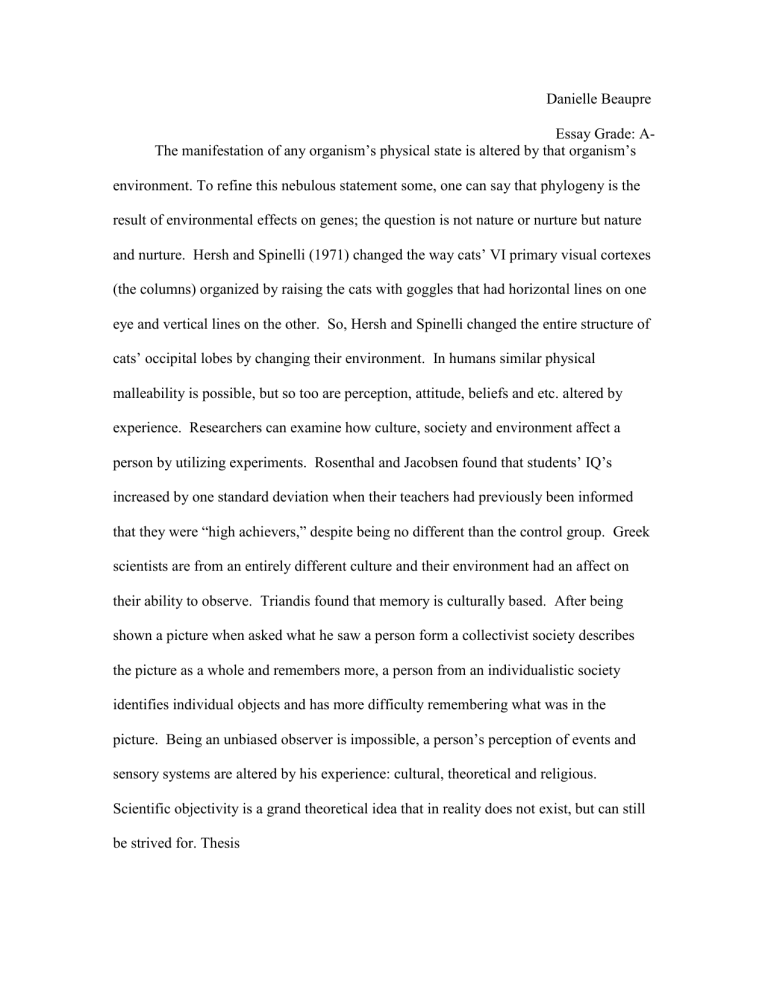
Danielle Beaupre
Essay Grade: A-
The manifestation of any organism’s physical state is altered by that organism’s environment. To refine this nebulous statement some, one can say that phylogeny is the result of environmental effects on genes; the question is not nature or nurture but nature and nurture. Hersh and Spinelli (1971) changed the way cats’ VI primary visual cortexes
(the columns) organized by raising the cats with goggles that had horizontal lines on one eye and vertical lines on the other. So, Hersh and Spinelli changed the entire structure of cats’ occipital lobes by changing their environment. In humans similar physical malleability is possible, but so too are perception, attitude, beliefs and etc. altered by experience. Researchers can examine how culture, society and environment affect a person by utilizing experiments. Rosenthal and Jacobsen found that students’ IQ’s increased by one standard deviation when their teachers had previously been informed that they were “high achievers,” despite being no different than the control group. Greek scientists are from an entirely different culture and their environment had an affect on their ability to observe. Triandis found that memory is culturally based. After being shown a picture when asked what he saw a person form a collectivist society describes the picture as a whole and remembers more, a person from an individualistic society identifies individual objects and has more difficulty remembering what was in the picture. Being an unbiased observer is impossible, a person’s perception of events and sensory systems are altered by his experience: cultural, theoretical and religious.
Scientific objectivity is a grand theoretical idea that in reality does not exist, but can still be strived for. Thesis
Despite the shortcoming of almost all observations a scientist can still strive for unbiased data. The Greeks are credited with ‘starting’ western science and society is grateful. Greek science was riddled with bias, but it is due to their entrepreneurial (word choice) efforts that science is where it is at today. Herodotus does not even acknowledge the idea that the ocean covers the earth as a plausible hypothesis. But he acknowledges seasonal change and the rainy season. Plato and Ptolemy assume the universe functions in an ordered fashion. Consistency and order are innate theoretical and cultural biases in
Greek descriptions. At lease Plato and Ptolemy are looking outside the earth and asking questions. Socrates compares thunder to flatulence since he lacks the correct language and this coincides with his theoretical bias. Although, rudimentary Socrates’ idea of how it rains is beginning to point in the right direction. (you may want to move the comma one word forward to make this sentence flow) Another lesson is that society has learned from the mistake that biases can cause, i.e. burning people at the stake, regardless of the inevitability of bias.
Numerous excerpts from Greek scientific literature show both cultural and theological biases; in fact most of the theological biases are cultural biases. The writings from Herodotus: II 19-31 exemplify both cultural and theological biases. Herodotus scoffs at the most “marvelous” theory someone proposed to explain the rise of the Nile.
The man stipulates that the Nile is connected to the ocean and the ocean goes around the world and this causes the rise. While this is not the explanation for the Nile’s rise,
Herodotus dismisses the idea of a continuous ocean like a cold sore. Culturally speaking he is a land mammal and has not explored the ocean. (they didn’t have boats?) Therefore, the idea that the ocean is a continuous body is not feasible. Also, God made man in his
likeness and man walks on dirt, thus land must be the most extensive continuous mass on earth. Not only is Herodotus biased in this example but he lacks the means to observe the extensive ocean. Herodotus’s explanation is obviously biased also. First, Herodotus attributes the rise to the movement of the sun and its interaction with rain. The idea that the sun moves around the earth epitomizes the Greek cultural and theological bias that the earth is the center of the universe. Secondly, Herodotus explains the parts of the phenomena in terms of nature, but he allocates God like traits to explain how the phenomena occurs. The sun has the ability to “attract” and “repel” water, then the wind
“holds” the water “scatters” the water and “reduces it to a vapor.” It is easy to judge and criticize another culture and time’s errors.
In one Greek text students are asked to explain a biased answer. Plato asks his students to explain the movement of the planets, but in terms of precise, uniform movements. Plato also reminds students that the earth is the center of the universe and does not move. Answering a biased question means blatantly altering data to answer the question or somehow only observing supporting evidence. (See Bothun’s notes on systematic errors) Biologically speaking a person’s amygdala and reticulator activating system will selectively choose what to notice based on experience. So, a person can gather scores of biased information and not be aware. Or, a student can break all taboos and put the sun at the center of the universe, and be told he is wrong and threatened with legal action for heresy.
In Aristophanes Clouds play several forms of bias are present, but most evident is a bias of omission. As was discussed in class and is evident in this text if a culture lacks a language to describe/observe a phenomena then the observation is biased. Inuits have
around seventeen words to describe snow and their description of a snow day will differ dramatically from a person that has never seen snow. Socrates compares thunder to human flatulence and adds that the two even sound a like. Lightening (sp?) is likened to an observable occurrence, a pig exploding due to heat pressure while being cooked. But, in reality, a cloud captures the hot wind, until it escapes as lightening (sp?). Again, here the natural elements are given God-like traits as in Herodotus. So, in this literature bias with a less negative connotation is evident.
A person’s experience and perception of the world is greatly influenced by his environment; especially theoretically, culturally and theologically. A person can best combat bias by being aware they exist and detailing his methods and procedures in an experiment. It seems almost inherent that a scientist will be wrong when he is on the forefront of science. The Greeks were on the forefront of science as the west knows it today, and Greek scientific observation includes a lot of biases. But as Funder likes to say, there is only bad data, but bad data is better than no data.
I like it. You bring a lot of interesting tid bits to the paper and you used source material well. I would have liked to see you use the Herodotus article to a larger extent, and look for these biases in more detail. I also found that, while “the Clouds” was a decent example, you may have done more to say why or why not this it is detrimental to scientific discovery. In your thesis, it was split into two parts and I was looking for you to address the second section at some point in your paper, but I had a hard time finding the section on objectivity. Hmm… a non-existent argument on non-existing objectivity.
Consider that one.
I left wondering if you could have done more to point out what would make for the good generation of science, such as addressing the work of Galen. How does his science fit into your model of bias and objectivity?
Overall, you’ve got a lot of the right ideas, you just need to take some time to articulate them a little more. However, I know that you were rushed and had to write two papers in one day. It would obviously be beneficent to finish the paper with less rush, but we all know hao things can get with school and work.
